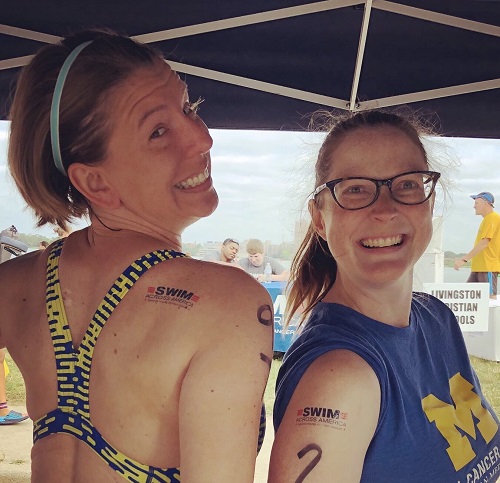Swim (or walk, bike, hike) Across America to support cancer research
Media contact: Nicole Fawcett, 734-764-2220 | Patients may contact Cancer AnswerLine™ 800-865-1125
Annual fundraising event goes virtual (hint: it’s easier than ever to participate)
For Erin Christensen, it was an outlet to start swimming again. For Kristin Van Raaphorst, it was a return to something she did through college and beyond.
This year, it’s something different.Like everything else, Swim Across America - Motor City Mile, an open-water swim that raises money for the Rogel Cancer Center, had to adjust this year.
Instead of an in-person event along the Detroit River, Swim Across America will be in a virtual format, allowing participants to track their time or miles doing any activity – not just swimming. That includes biking, hiking, running or any other physical activity.
But in a time of both a pandemic and protests over racial equity, does a fundraiser for cancer research matter?
“There is a unifying factor around cancer that affects everyone, and both the pandemic and racial unrest are connected to it,” says Van Raaphorst, who works in research administration at the Rogel Cancer Center.
“The pandemic is changing the face of cancer treatment and even changing the face of cancer research. A lot of coronavirus treatment research is coming from cancer labs. At the same time, communities of color are disproportionately affected by certain cancers. Large numbers of them don’t have the same access to care, and further, the standard of care is not the same across the board. We need to change that, and our researchers are working to change that. By doing something like Swim Across America, it’s not ‘instead’ of the pandemic or turning away from racial equality issues. It’s having your boots in all three sectors.”
Christensen, an administrative assistant in the Rogel Cancer Center who has been working remotely since March, says participating in Swim Across America this year is a form of self-care.
“For me it’s been a good grounding factor, a distraction but a good one,” she says. “It’s powerful to realize you are working toward something that’s going to be a benefit for cancer research.”
Furthering cancer research
All money raised through Swim Across America goes directly to the Rogel Cancer Center and is distributed through a competitive grant process. Last year’s event resulted in a $50,000 grant to Kyoung Eun Lee, Ph.D., assistant professor of pharmacology at Michigan Medicine.“Receiving the Swim Across America Young Investigator Award is a great honor and will enable me to build a new research program,” says Lee, whose work is in understanding the fundamental biology of pancreatic cancer to identify new diagnostic and treatment strategies.
“Swim Across America funding will provide resources to investigate how low oxygen levels affect cancer cells and their interactions with the surrounding microenvironment. Through these studies, we hope to ultimately develop novel therapeutics aimed at manipulating the tumor microenvironment,” Lee says.
Virtual event has a broader reach
This year, organizers hope the virtual format will allow more people to participate. The “Coast to Coast” format has participants working together to “travel” across America, hitting each of the 21 cities with open water events for a 7,686-mile journey. You make progress along the route by logging miles, hours or donations. Registration is $25 and there is no fundraising minimum.
Van Raaphorst participated in the Motor City Mile swim before it was affiliated with Swim Across America. She said the event last year had a “fantastic” atmosphere and felt very celebratory. But she notes a difference from other cancer-focused fundraisers, where survivors are touted as warriors and heroes. Here, researchers are supported as pioneers and tide-turners.
“I felt good about it because this actually directly helps the research. It’s the scientists and the clinicians and lab assistants who toil to discover the pathways that move us forward to the end of cancer,” she says.
Christensen recalls how she was struck by the event’s power when she came out of the water at the end of her swim to see Van Raaphorst, with whom she’d trained, and her mom, who was there to support her, amid cheering crowds of swimmers, survivors, researchers and health care providers.
“Leading up to the event, it was more about the swim and my own individual journey. But when I got there, that’s when the pride sank in. I realized what we were swimming for and how much people supported us individually as well as the Rogel Cancer Center in general. It was overwhelming.”
Learn more about the multiple ways to be part of Swim Across America.
Read more about Kyoung Lee's research.


